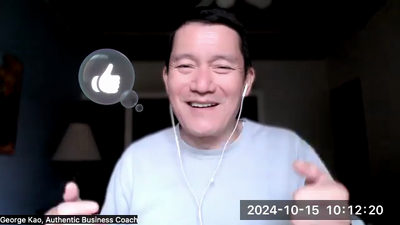- Orientation
- BizPlan
- BizPlan25
- Authentic Speaking
- Authentic Market Discovery
- Create Aligned Offers
- Joyful Productivity (Course)
- ✨ Authentic Outreach (AO)
- Joyful Pro
- Blog-to-Book
- 🚀 Course Creators
- 🖼️ Your Signature Framework
- 🙋 Effortless Yes
- 🌈 Energy Signature
- Meta Ads (FB / IG Advertising)
- 📱 Instagram Mastery
- 🎤️ Interview Mastery
- Launch Your Group Program
- Netcaring
- 🦸🏽✍🏽 Soulful Content (OGI)
- Substack Course
- "What do you do?"
- 🎬 YouTube Mastery
Hello! I am Roxanne, founder of Therapy Without Boxes. I am super new in my entrepreneurship journey. I am driven by a vision to revolutionise the way we approach psychological distress and empower individuals on their healing journeys. This passion stems from my own profound experiences of losing a loved one to suicide, an event inextricably linked to the damaging practices of the mainstream mental health system, and the harm I endured as an ex-service user myself.
After years of working within this flawed system, I have come to realize the limitations of the predominant biomedical model and the urgent need for a more holistic, person-centered approach. This realization has ignited a desire within me to establish an unconventional counseling practice inspired by the Power Threat Meaning Framework from the British Psychological Society. Psychiatric labels don't tell truthful stories. My goal is to move away from the traditional pathologising of human experiences and instead embrace a compassionate, trauma-informed understanding of distress.
---
I enjoy spirituality, particularly practise open awareness meditation and body oriented approach (focusing).
I would love to connect to with like-minded and like-hearted folks :)
---
At this point, I don't really use social media. I am most active on Linedkin. Here's the link https://www.linkedin.com/in/roxannekoh/
IG: https://www.instagram.com/roxannekoh/
Hello! I am Roxanne, founder of Therapy Without Boxes. I am super new in my entrepreneurship journey. I am driven by a vision to revolutionise the way we approach psychological distress and empower individuals on their healing journeys. This passion stems from my own profound experiences of losing a…
 9:16
9:16
Consistent Time & Place
"I wish I could record videos with my laptop, but often when I'm inspired, I'm not near my laptop..." Inspiration is good, but consistency is required for the practice of authentic speaking. For most of us, inspiration is not sustainable for practice. In part because you'll often get discouraged if your inspiration isn't reciprocated by your audience's engagement. For sustained practice, see it as a sustained practice! How then to relate to inspiration? I would recommend habituating the writing down of ideas whenever inspiration comes... but then dedicate yourself to a consistent time/place when you record videos. During your planned time/place for making videos, take out those ideas you wrote down, and pick one that inspires you in that moment :)
- Summarize this thread
- Copy link
I guess I am weird as I am now because there is nobody in the Philippines who has short grey hair, wears no makeup, always wears a white blouse/ shirt, who talks about the different areas of small businesses that owners should focus on.
- Summarize this thread
- Copy link
@Myrna Natividad that's great!
@Myrna Natividad you are outstanding!
- Summarize this thread
- Copy link
I'm looking forward to leaning in and finding my weird. I'm sure it's not far away, I've just been suppressing it to " fit in." Banishing that now....
@Claire Magdalena Sierra keep going.... I am sure your body will speak to you in time to come~
Trigger warning: suicide.
I am probably an outlier in the mental health field.
The usual narrative is people find therapy helpful so they become therapists to help others (Not saying this is bad).
Mine is the opposite. It was the harm that I experienced and my cousin's suicide that draw me. I want to prevent harm and help others.
I am committed to increasing my level of consciousness.
- Summarize this thread
- Copy link
@Roxanne Koh (Therapy Without Boxes) I love that you have a powerful motivation to help others!
Thanks much for your kind words🙏
- Summarize this thread
- Copy link
@Roxanne Koh (Therapy Without Boxes) that's a BIG why! 😍
@Claire Magdalena Sierra this warms my heart❤️ Thank you!
- Summarize this thread
- Copy link
My weird is that I love to dance.. maybe I can bring in some dance movements while I speak! I also tear up very easily when I feel moved by my client's or friend's sharing. I think my silence speaks more than my words.
@Bingz Huang I would love to see your dance when we meet! Shall we dance together? I want to join in your 'weird'. I have to upfront. My dancing skill is zero ><
- Summarize this thread
- Copy link
@Roxanne Koh (Therapy Without Boxes) yes! let's dance together at the park! :D
 4:56
4:56
"It feels like my offer is a commodity... not special"
This is a preview lesson and you can watch it by clicking the Play button above. Enjoy :) Regarding the comments below -- to read or add, you need to have enrolled in one of my courses recently. Check out the options here. Any course you enroll in will give you 2 months of full access to these Q&A segments, including the ability to read and add comments.
Thank you George for the reminder 😊





Consistent time would be Sat morning.
As for place would be my own room.
Virtual background does not look good... not sure if it's my webcam